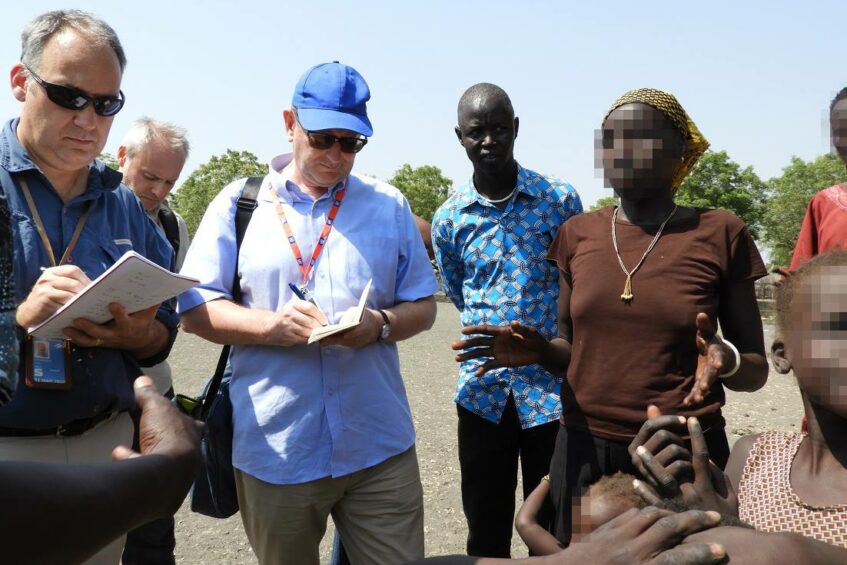
Former and current members of the Commission on Human Rights in South Sudan interview an internally displaced person in Akobo, South Sudan, December 2017. (©UNMISS Photo - Adebayo Ayokunle).
Amnesty International said South Sudan is yet to make progress in administering justice and
accountability for victims of human rights violations, while calling on the government to speed up the process.
Chapter 5 of the 2018 peace accord stipulates that the transitional government to establish through legislation the transitional justice institutions to hold perpetrators accountable and reconcile South Sudanese following years of civil war.
The institutions include Commission for Truth, Reconciliation and Healing (CTRH), the Hybrid Court for South Sudan (HCSS), an independent hybrid judicial body; and the Compensation and Reparation Authority (CRA).
However, Amnesty International said such provisions have stalled and the transitional government continues to delay their implementation.
“The government continues to drag its feet in implementing Chapter V of the revitalized
peace agreement which contains mechanisms critical to the right to truth, redress, and
accountability for crimes under international law,” the rights group said.
The statement was made in an interactive dialogue with the United Nations High Commissioner on Human Rights on April 2, 2024.
“The process to establish the Commission for Truth, Reconciliation and Healing and the Compensation and Reparations Authority has stalled since the bills were tabled in the transitional parliament on 5 December 2023.”
Amnesty International also expressed concerns about the pending review of the National Security Service (NSS) Amendment Bill which has been held up in parliament since May 8, 2023.
“The current NSS Act allows the agency to commit serious abuses with impunity, while creating and sustaining a climate of repression and fear,” it stated.
The group said the South Sudan government’s “failure” to put in place the much-needed Hybrid
Court for South Sudan is equally concerning.
It underscores that victims and survivors of atrocities continue to wait for justice and accountability, almost ten years since the promise to set up the court was made.
Further, the body said it has seen an increase in human rights violations through arbitrary arrests and violation of press freedom in South Sudan as the country prepares for its first election in December 2024.
According to the agreement, the Commission for Truth, Reconciliation, and Healing is a critical part of the peace-building process in South Sudan, to address the legacy of conflict and promote national reconciliation and healing.
It is mandated to inquire into all aspects of human rights violations and abuses, breaches of the rule of law, and excessive abuses of power committed against all persons in South Sudan by state, non-state actors and or agents, and allies.
The Hybrid Court for South Sudan is an independent hybrid judicial court, which will be established by the African Union Commission to investigate and prosecute individuals bearing responsibility for violations of international law or applicable South Sudanese law.
The HCSS will investigate crimes committed from 15 December 2013 to the end of the Transitional Period.
Only three years after independence, South Sudan slipped into a vicious civil war that has killed an estimated 400,000 people and displaced more than 4 million people, according to the United Nations.
Support Eye Radio, the first independent radio broadcaster of news, information & entertainment in South Sudan.
Make a monthly or a one off contribution.
Copyright 2024. All rights reserved. Eye Radio is a product of Eye Media Limited.